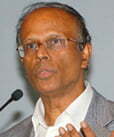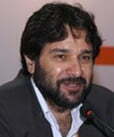
The COVID-19 pandemic has wreaked havoc across India, deepening poverty, inequality, and structural vulnerabilities. This underscores the need to re-examine past development choices and strive for healthy, sustainable, and inclusive cities, urban areas, and rural communities.
The 2021 Urban Policy Dialogues (UPD 2021) places the urban as central to new imaginations of post-pandemic futures and many reconfigurations of policy and practice to realize them.
The COVID-19 pandemic has wreaked havoc across India, deepening poverty, inequality, and structural vulnerabilities. This underscores the need to re-examine past development choices and strive for healthy, sustainable, and inclusive cities, urban areas, and rural communities. The 2021 Urban Policy Dialogues (UPD 2021) places the urban as central to new imaginations of post-pandemic futures and many reconfigurations of policy and practice to realize them. UPD 2021 is the 7th edition of IIHS’ Urban Policy Dialogues and is being held virtually.
UPD 2021 is anchored around the overarching question of ‘The Role of the Urban in Post-COVID Recovery’. It will do so by focusing on three themes: resilient infrastructure; inclusive water and sanitation; and land and housing. These thematic entry points will enable discussions on potential post-COVID recovery pathways, and where urban areas can contribute.
- Role of the Urban in Post-COVID Recovery
India’s post COVID-19 economic recovery agenda should prioritize sustainable job creation, strong social safety nets, resilient infrastructure development, and green housing and buildings, and commit to addressing social, regional, and spatial inequalities. Cities and urban regions, given the concentrations of people and economic activity they represent, need to be the key site for such recovery processes and outcomes. A range of institutional and financing issues will need to be engaged with for unlocking the urban’s potential to heal and transform.
- Realizing Resilient Urban Infrastructure: Possibilities and Challenges
India will witness significant urban infrastructure investment in the coming years. This will be critical for economic growth, living condition improvements, and post COVID-19 recovery goals. Attention to resilience issues is necessary to ensure that these gains are not fragile and that investments deliver on other important goals of inclusive development, deep decarbonization, and transformative climate adaptation, and serve as a pivot for transitioning to a more resilient economy and society. Enabling resilient infrastructure will require improved understandings of risks, shocks, and stresses, the dense physical and process interconnections within city infrastructure systems, and the potential synergy between spatial planning, economic development, infrastructure financing, and urban governance.
- Water and Sanitation: Towards Inclusive Service Delivery
The recently announced AMRUT 2.0 and SBM- Urban 2.0 offer an opportunity to sustain the investment and reform momentum that earlier incarnations of the two Missions have created. A familiar set of issues will need continuing attention: resource governance and management, service quality, pricing, and local government and community engagement. The urban poor face challenges of affordability, tenure, and voice in accessing quality services. Differences across states and town size classes require nuanced appreciation of resource and institutional contexts and adaptation of implementation approaches. Safety, dignity, and working conditions of workers engaged in the sector, particularly informal sanitation workers, has been a long-standing concern. Hence, achievement of sector goals, will be critically determined by inclusion and near-universal access.
- Land and Housing: Key Developments and Future Directions
Land and housing are important drivers for post-COVID recovery. Land management is critical to ensure that cities and regions best utilize their economic and development potential, by provisioning for sustainable use, development of resilient infrastructure, enabling revenue buoyancy for local bodies, and ensuring tenure security and housing for the poor. Housing investments present an opportunity for realizing secure, affordable, healthy, and dignified living conditions, especially for the poor and the most vulnerable. While updated and well-documented land rights have a role to play in this, there is a strong case for complementing affordable housing construction with housing upgradation and rental housing programmes and improved regulation of real estate activity.














